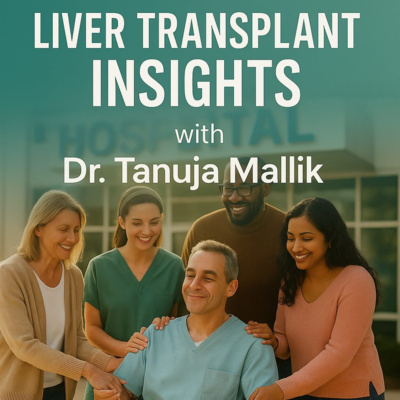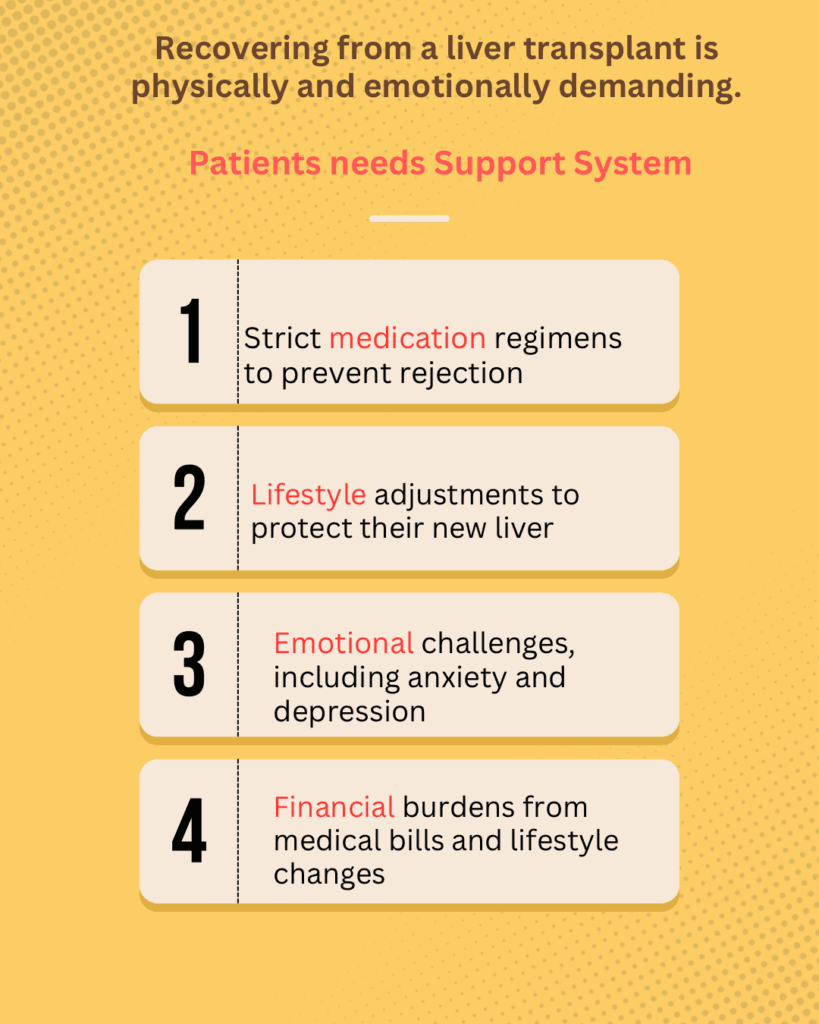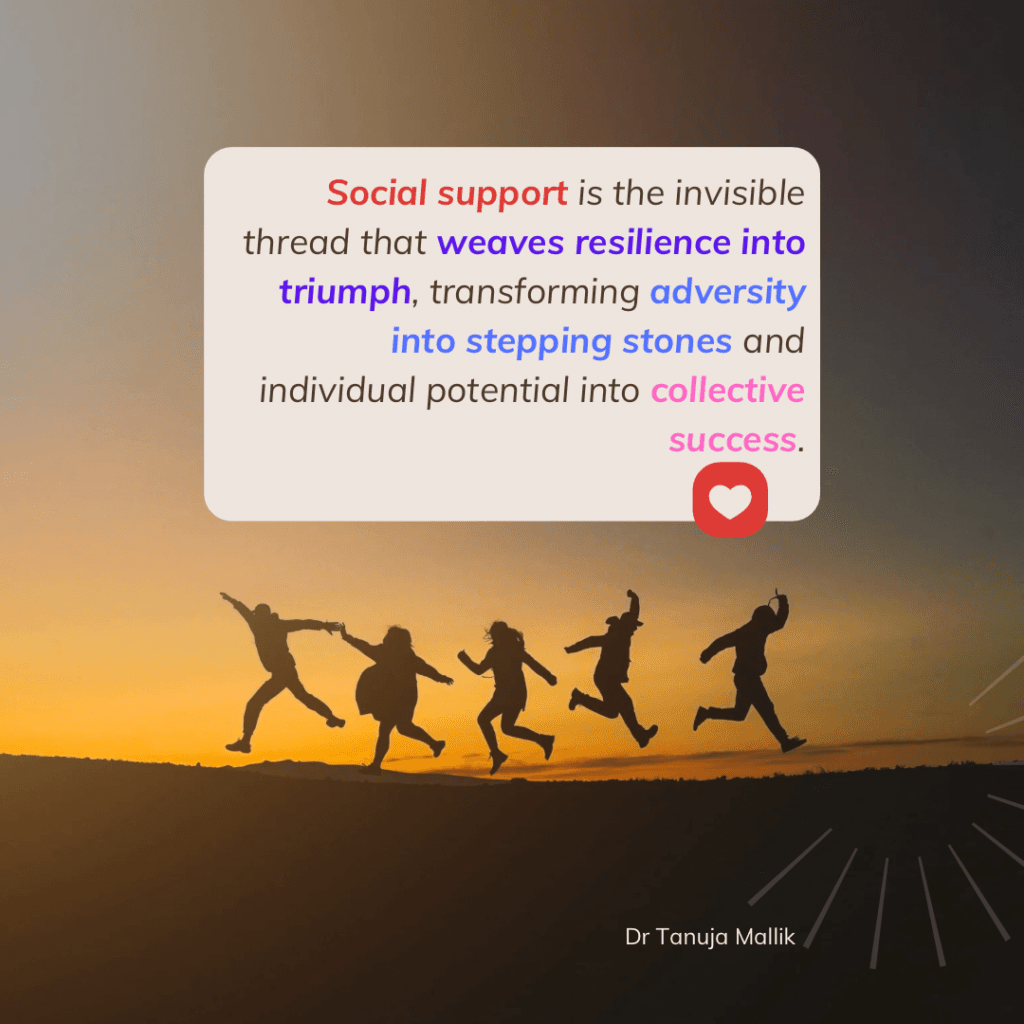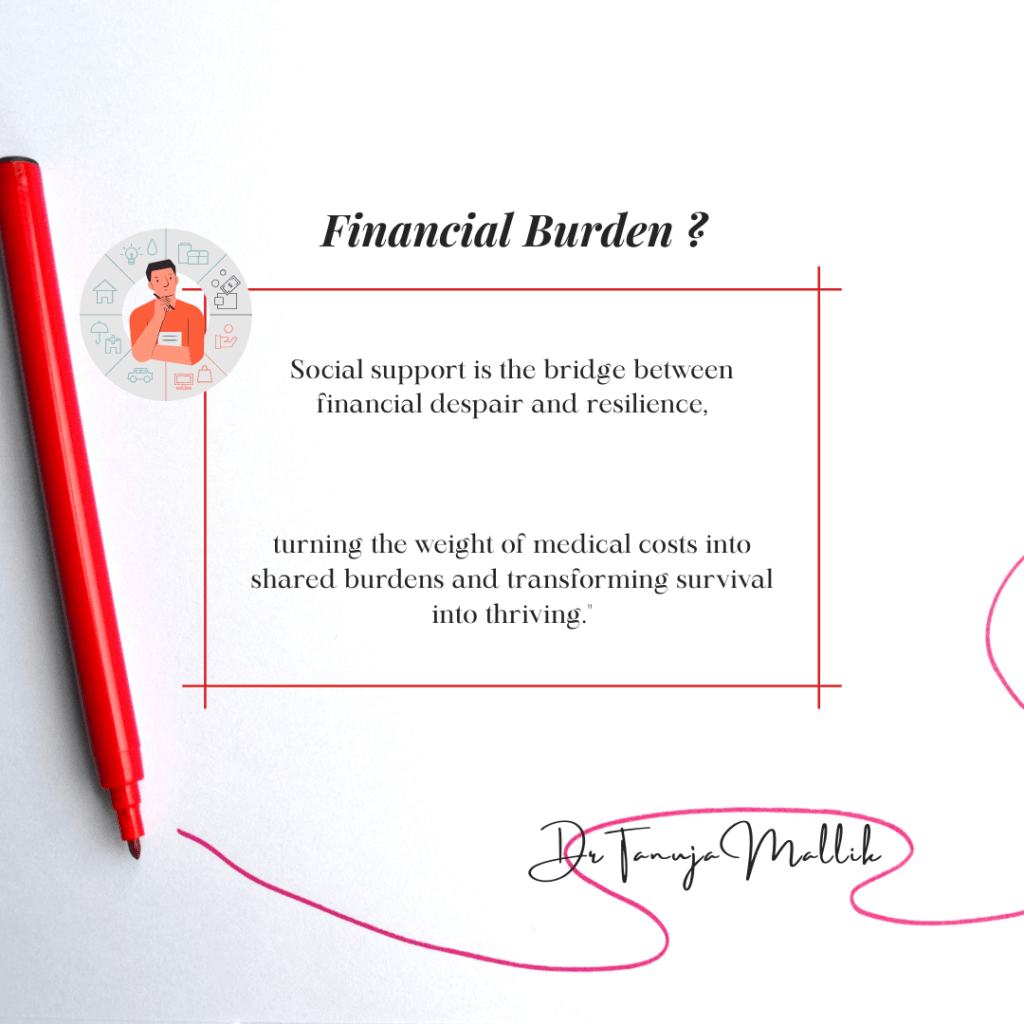Introduction
Imagine This…
Mr. X walks into the transplant OPD alone.
He’s just 43 — a father of three, the sole breadwinner of his family. His liver is failing, and he knows time is ticking. His medical reports come in quickly. Yes, he needs a liver transplant. Urgently.
But here’s the catch:
He doesn’t have a strong support system. His wife is willing but overwhelmed. There are no parents, no siblings nearby, no financial backup. After the surgery, who will help him walk again? Who will make sure he takes his medicines on time, eats right, and gets to follow-ups? Who will manage the home and the three kids when he’s recovering?
This is not a rare story.
As liver transplant doctors, we often meet patients who are medically ready for transplant, but socially unprepared. And that makes all the difference.
Social support isn’t just about a few hospital visits or well-wishes. It’s about having:
✅ Someone to care for the patient post-op
✅ Emotional support during recovery
✅ Financial planning and help
✅ Medication reminders and hospital visits
✅ Long-term encouragement and monitoring
Without this, even a technically successful surgery can fail outside the hospital walls. Patients with inadequate support are at higher risk of complications, non-adherence to meds, depression, and even death.
This is why assessing social support is a vital step before approving a transplant. Transplant coordinators play a key role in evaluating this, and when needed, helping families build a backup system before proceeding.
In this blog, we’ll explore 8 powerful ways in which social support transforms liver transplant outcomes — and why building a circle of care might be the most healing thing a patient can do.
🎙️Podcast: Social Support Role in Liver Transplant Success

Comprehending Social Support in the Liver Transplant Context
Social Support Transforms Liver Transplant by impacting the health and well-being of people undergoing major medical procedures, especially liver transplantation, and it transforms the success of these treatments. It includes a variety of help that falls into three primary categories: practical, informational, and emotional support. For patients negotiating the complications of liver transplant surgery and recovery, each of these dimensions is crucial.
The psychological comfort that friends, family, or support groups can offer is known as emotional support, and it can greatly improve a patient’s coping skills in times of stress. For patients waiting for organ transplants, emotional support is especially crucial since it creates a sense of community and lessens feelings of loneliness. Resilience and morale can be raised by knowing that they have a network of people who are concerned about their welfare.
On the other side, informational assistance entails giving helpful advice and knowledge during the transplant procedure. This can involve exchanging stories, providing perspectives from previous patients, or even expert counsel from social workers or medical professionals. Patients who have access to reliable information are better equipped to decide on their post-transplant treatment options and lifestyle adjustments.
Tangible support includes practical assistance, such as help with daily tasks, transportation to medical appointments, or financial aid. Such support can alleviate the burdens faced by patients and their families, allowing them to concentrate on recovery without the added stress of logistical challenges.
This multifaceted support system not only enhances patients’ mental and emotional health but also contributes positively to their physical recovery, ultimately leading to greater success in liver transplantation outcomes.
In this blog, we’ll explore the eight powerful ways social support enhances liver transplant outcomes, helping patients navigate their post-transplant life with confidence.

1. The Impact of Emotional Social Support Transforms Liver Transplant Success Story
Patients frequently experience anxiety, despair, and feelings of loneliness as a result of the intricate nature of this surgical procedure. Strong emotional support systems made up of friends, family, and medical professionals can act as a barrier against these emotional disruptions and foster a healing atmosphere.
According to research, patients who receive a lot of emotional support during their recovery period typically have lower levels of anxiety and sadness. Compared to patients who dealt with their difficulties alone, individuals who maintained healthy emotional relationships showed noticeably more resilience, which aided in their quicker recovery. In addition to offering moral support, these kinds of connections can be quite helpful in handling postoperative care responsibilities.
Additionally, emotional support is essential for improving patient compliance with medication and post-operative care. Patients are more likely to regularly take their prescribed medications and show up for follow-up consultations when they report feeling emotionally supported. By avoiding difficulties during what is frequently a difficult recuperation period, this adherence is essential to enhancing long-term transplant results.
By fostering a feeling of emotional safety and belonging that promotes healing, Social Support Transforms Liver Transplant patient outcomes. Patients might feel more empowered by talking about their worries and getting support from loved ones, which can improve their mood
2. Social Networks and Their Role in Patient Compliance
Family members’ support is essential in ensuring patients follow the post-operative instructions, which include rigorous dietary changes and medication regimens that are essential for preserving liver health. For example, including a family member in meal preparation helps guarantee that dietary needs are satisfied, supporting general well-being and healing.
Social networks can also encourage a sense of responsibility. Patients are more likely to follow their treatment plans when they are aware that someone else is keeping an eye on them or helping them along the way. Reminders about follow-up appointments, shared meals that adhere to dietary restrictions, or frequent check-ins can all contribute to this accountability.
The likelihood of a good liver transplant outcome is therefore increased by such a network, which also encourages a cooperative recuperation process and increases the patient’s drive. It is obvious the importance of the relationship between patient compliance and their association with their Peer group. And how such Social Support Transforms Liver Transplant Success stories in the long run.
3. A Lifeline for Transplant Recipients: Peer Support Groups
Peer support groups play a crucial role in the journey of liver transplant recipients by providing an invaluable resource for emotional and practical support. These organisations are made up of people who have gone through similar things, so they may share their knowledge, challenges, and victories in a safe space. It is impossible to overestimate the importance of these relationships since they frequently promote a sense of community that is critical to healing.
The normalisation of experiences that liver transplant recipients would feel alone in facing is one of the main advantages of peer support groups. People discover they are not travelling alone through shared stories. Anxiety and despair are prevalent among people going through major health issues, and this shared understanding might help reduce them. Such a group gives members the coping skills that promote emotional healing by promoting candid conversations about individual anxieties, expectations, and recovery physicalities.
Members of these support groups also frequently offer helpful guidance based on their personal experiences. The knowledge exchanged can greatly speed up a recipient’s recuperation, from advice on post-operative care management to suggestions for physical therapy and diet. Usually unavailable through medical channels, this useful information might enable people to make well-informed choices regarding their lifestyle and health after receiving a transplant.
These clubs also provide networking possibilities that could lead to long-lasting friendships and support systems. These connections give patients a lifeline of ongoing support, motivating them to stick to their treatment and recovery plans.
In the end, peer support groups are unquestionably helpful in the liver transplant community. They represent a place where transplant patients may unite, exchange stories, and develop a sense of community that is crucial for overcoming the challenges of transplant recovery.
4. The Psychological Effects of Social Support on Success Outcomes

The goal of the pre-transplant psychosocial evaluation is to find any weaknesses that might compromise post-transplant health and treatment compliance. This is a crucial area of assessment since a history of substance misuse might have a detrimental effect on post-transplant results. Pre-existing mental health issues need to be carefully managed because they can impact adherence. The evaluation searches for any behavioural problems that can make it more difficult to follow medical advice.
Social support has an important role in the psychological well-being of patients undergoing liver transplant surgery. A person’s mental health can be enhanced and their surgical recovery significantly impacted by the practical and emotional assistance that friends, family, and the community can provide. Research indicates that those who have support tend to have lower levels of stress and anxiety, which can be important both before and after liver transplant procedures. One major way that social support is beneficial is by promoting a feeling of acceptance and belonging. This inclusion can help reduce feelings of loneliness that may follow a significant medical operation or a chronic illness.
As a result, those who believe they have social support may report feeling better about themselves and having a more positive attitude about their surgery experience. Patients who receive this psychological boost are more likely to follow their treatment plans and participate completely in their recuperation, both of which are directly related to better health results. Furthermore, having social support networks makes it easier for people to handle the challenges of pre- and post-operative care. Whether it’s help with everyday chores, emotional support during trying times, or access to information and resources that are shared, these types of instrumental support ease the patient’s load and let them concentrate on getting better.
In the end, having strong social support can result in less psychological distress, which is important because higher stress levels have been linked to worse surgical results. In conclusion, social support’s psychological effects have a big impact on how well liver transplant procedures go. A good support system can improve a person’s resilience and coping skills by reducing stress and cultivating a positive self-image, which will improve recovery outcomes overall.
5. The Impact of Family Dynamics on Post-Transplant Health

Following a liver transplant, the patient’s experience is shaped by a variety of factors, including familial dynamics. Family members frequently take on a variety of responsibilities, including financial support, emotional support, and caregiving, all of which can have a significant effect on how well a liver transplant patient recovers. How well a patient follows treatment instructions and participates in their recuperation can be determined by these responsibilities.
Conversely, the healing process may become more difficult in families with poor communication. The patient might not feel supported if the caregiver is stressed out or does not grasp medical advice. Strong family support networks have been linked to reduced anxiety and increased patient satisfaction with care, according to research. Post-transplant health outcomes are improved when family members actively engage in the healthcare process by going to doctor’s appointments and standing up for the patient’s demands.
Furthermore, the dynamics of family roles might affect the healing environment as a whole. Families that keep a positive outlook and encourage candid discussions about health issues provide a supportive environment for the patient. A family that cooks nutritious meals together after receiving a transplant, for instance, can help lessen the sense of loneliness that frequently accompanies the recuperation phase. These common experiences improve family ties and the patient’s compliance with medical guidance.
6. Addressing the Financial Burdens of Transplantation Through Social Support

A diversified strategy that incorporates social support systems like crowdfunding, aid from non-governmental organisations (NGOs), and government-funded programs is required to address the financial obstacles related to liver transplantation in India. With the help of crowdfunding websites like Ketto, patients may now raise the money they need via donations from the public. People can effectively mobilise assistance for pre- and post-transplant expenses by starting internet campaigns where they can tell their stories and ask for donations.
A number of NGOs provide liver transplant recipients with advocacy and financial assistance in addition to crowdsourcing. For those in need, the Liver Pancreas Foundation of Hyderabad (LPFOH) offers a free platform that helps them raise money from the general public and guarantees openness in the use of funds. Section 80G of the Indian Income Tax Act provides tax benefits to donors who make contributions to LPFOH. In a similar vein, the Indian Liver Trust works to increase public knowledge of liver illnesses, encourage organ donation, and provide financial support to people in need of treatment.
Government initiatives also play a crucial role in alleviating financial burdens. The Rashtriya Arogya Nidhi provides financial assistance to patients living below the poverty line, covering treatment costs for life-threatening diseases at designated super-speciality hospitals. State-specific programs like the Karunya HealthCare Scheme in Kerala offer health insurance coverage up to ₹5 lakhs per family annually for secondary and tertiary care hospitalisations, benefiting economically weaker sections of society. Additionally, the Ayushman Bharat Scheme aims to provide comprehensive health coverage for eligible beneficiaries.
Patients can considerably lessen the financial obstacles related to liver transplantation in India by utilising these social support channels—crowdfunding websites, specialised NGOs, and government-funded healthcare programs—ensuring access to essential medical procedures without experiencing undue financial hardship.
Furthermore, better resource management can result from knowledgeable social support, allowing patients to shift their attention from money concerns to their care and recovery. In summary, the extensive support system provided by friends and family not only reduces the financial burden associated with liver transplantation but also improves the patient’s perspective on their recuperation, encouraging a more focused and healthy approach to the path ahead.
7. Long-term Benefits of a Supportive Community
The rehabilitation process after a liver transplant is greatly impacted by the ongoing support that a community offers. Social support can take many different forms, such as informational assistance, practical help, and emotional support, all of which are vital for improving transplant patients’ general well-being. According to studies, people with robust social networks typically live longer and have better health outcomes than people with weaker support networks.
Improving mental health is one of the main long-term advantages of living in a supportive environment. Long-term social ties can help reduce the psychological difficulties, including anxiety and depression, that frequently follow a major surgery. Speaking with friends, relatives, or support groups enables people to express their emotions, get validation for their experiences, and learn from others who have dealt with comparable health issues. A more optimistic view of life might result from this social engagement, which also builds resilience.
Furthermore, improved post-transplant health management practices are influenced by social support. People are more likely to follow post-operative care instructions, such as medication regimens and lifestyle modifications, if they are a part of a supporting network. Family members’ support can inspire patients to adopt healthy habits, such as consistent exercise and a well-balanced diet, which are essential for the transplant’s long-term effectiveness. Improved liver function and a lower risk of complications have been associated with increased adherence to medical recommendations.
Strong communities also help people feel like they belong and have a purpose, which are important components of staying motivated and involved in one’s health journey. Engaging with support networks regularly can assist people in overcoming obstacles that may come up throughout their recovery and motivate them to stick with their health objectives. Social support is therefore crucial for improving liver transplant recipients’ quality of life and health outcomes, and its long-term advantages go well beyond the short-term recuperation phase.
8. Formulating a Strategy for Establishing and Sustaining Support Systems

Building a strong Social Support Transforms Liver Transplant Success. This network has the potential to greatly increase procedure success and well-being. Patients and caregivers should take proactive measures to involve friends, family, and community resources to start building a strong support network.
Patients should first identify important people in their lives who can provide logistical, emotional, or physical support. These could be neighbours, acquaintances, coworkers, or even relatives. In order for these people to comprehend the patient’s needs and how they might help, open and honest communication about the transplant journey is crucial. Setting up casual get-togethers or meetings can offer a forum for talking about the impending transplant and the kind of assistance needed after surgery.
The support system can be strengthened even more by utilising community services in addition to personal relationships. Numerous organisations concentrate on helping liver transplant recipients by offering necessary services like access to support groups or transportation. Patients are advised to look into nearby hospitals, transplant facilities, or nonprofit organisations that might have resources tailored to their particular situation. By matching patients with people who have gone through similar things, many of these organisations can help patients feel like they belong.
Additionally, using digital platforms can significantly improve connectivity. Peer-to-peer support can be fostered by providing a platform for patients and caregivers to exchange experiences and guidance via social media or online forums. For people who do not have close friends or family nearby to offer in-person assistance, these online support systems can be especially helpful.
In the end, preserving these connections via frequent check-ins and appreciation will fortify the support system, helping patients prior to and beyond liver transplantation. People can significantly improve their recuperation and general health by taking the initiative to make sure they get the social support they need during their transplant journey.
Are you or a loved one navigating a liver transplant? Join a support group, connect with others, and take advantage of resources designed to make your journey smoother and more successful.
🤝 Support Beyond Surgery: Tools for Your Transplant Journey
- ✅ Know Your Medicine – Understand key medications and stay on track
- ✅ Best Foods for Liver Health – Eat right to heal right, before and after surgery
💬 Need guidance with recovery or support planning? Book a 1-on-1 online consult with Dr. Tanuja Mallik to get expert help on building your care team, medication routines, and post-op lifestyle.
Frequently Asked Questions
Q1. How successful are liver transplants?
Liver transplants have high success rates. One-year survival is around 85–90%, and many patients live for decades post-transplant. Success depends on timely surgery, post-op care, medication adherence, and lifestyle changes — all of which are boosted by strong social support.
Q2. Who supports the patient during and after their transplant?
Support comes from a mix of sources:
- Family & friends for emotional strength and daily help
- Medical teams, including surgeons, hepatologists, and transplant coordinators
- Support groups or counsellors for mental health and peer connection
- Digital recovery consultants or coaches
Q3. Is social support associated with post-transplant medication adherence and outcomes?
Yes, strong social support is directly linked to better medication adherence, lower rates of rejection, and faster recovery. Multiple studies, including systematic reviews and meta-analyses, confirm that patients with solid support systems follow post-transplant regimens more effectively.
Q4. How does a person’s life change after a liver transplant?
Post-transplant life brings renewed energy, better health, and a second chance — but also requires lifelong care. Social support helps patients manage:
- Complex medication schedules
- Emotional ups and downs
- Lifestyle changes like diet and alcohol avoidance
- Long-term follow-ups and health monitoring
About the Author
Dr. Tanuja Mallik is a liver transplant anaesthetist and critical care specialist with years of experience in managing complex transplant cases.
Disclaimer
This article is for informational purposes only and is not a substitute for professional medical advice. Always consult your healthcare provider for personalized guidance.
